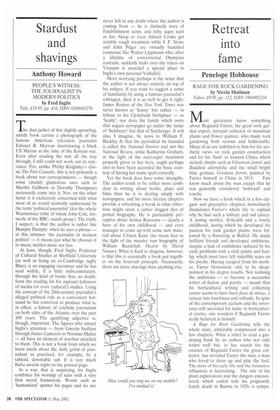Stardust and shavings
Anthony Howard
PEOPLE'S WITNESS: THE JOURNALIST IN MODERN POLITICS by Fred Inglis Yale, £18.95, pp. 416, ISBN 0300093276 The dust jacket of this slightly sprawling, untidy book carries a photograph of the famous American television journalist Edward R. Murrow interviewing a black US Marine at the time of the Korean war. Even after reading the text all the way through, I still could not work out its relevance. For, unlike Phillip Knightley's classic The First Casualty, this is not primarily a book about war correspondents — though some (mainly glamorous ones such as Martha Gellhorn or Dorothy Thompson) necessarily come into it. Nor, on the other hand, is it exclusively concerned with what most of us would normally understand by the term 'political journalist' (for the whole Westminster tribe of whom John Cole, formerly of the BBC, stands proxy). The truth, I suspect, is that the author is rather like Humpty Dumpty: when he uses a phrase — in this instance 'the journalist in modern politics' — it means just what he chooses it to mean, neither more nor less.
At least, though, Fred Inglis, Professor of Cultural Studies at Sheffield University (as well as being an ex-Cambridge rugby Blue), is an engaging raconteur and he has read widely, if a little indiscriminately, through the kind of books that, no doubt, form the reading list for aspirant followers of media (or even 'cultural') studies. Using the concept of the 20th-century journalist's alleged political role as a convenient hatstand he has contrived to produce what is, in effect, a history of celebrity journalism on both sides of the Atlantic over the past 100 years. The qualifying adjective is, though, important. The figures who attract Inglis's attention — from Lincoln Steffens through James Cameron to Norman Mailer — all have an element of stardust attached to them. This is not a book from which we learn much about the daily grind of journalism as practised, for example, by a tabloid, downtable sub. It is very much Bafta awards night on the printed page.
In a way, that is surprising, for Inglis combines his worship of stars with a very firm moral framework. Words such as 'humankind' spatter his pages and we are
never left in any doubt where the author is coming from — he is distinctly wary of Establishment icons, and lofty sages such as Joe Alsop or even Alistair Cooke get notably rough treatment while I. F. Stone and John Pilger are virtually beatified (someone like Walter Lippmann who, after a lifetime of conventional Olympian restraint, suddenly kicks over the traces on Vietnam is awarded a special place in Inglis's own personal Valhalla).
More worrying perhaps is the sense that the author is not always entirely on top of his subject. If you want to suggest a sense of familiarity by using a famous journalist's sobriquet, then it is as well to get it right. James Reston of the New York Times was never known as 'Sonny' but rather — in tribute to his Clydebank birthplace — as 'Scotty', nor does the family which owns that august newspaper go under the name of `Sulzbeyer' but that of Sulzberger. It will also, I imagine, be news to William F. Buckley Jr that the periodical he founded is called the National Interest and not the National Review, while Katharine Graham, in the light of the red-carpet treatment properly given to her here, ought perhaps also to have been accorded the basic courtesy of having her name spelt correctly.
Yet the book does have some strengths. The author tends to be rather more confident in writing about books, plays and films than he is in dealing simply with newspapers, and his more literary chapters provide a refreshing a break in what otherwise might seem a rather dogged diet of potted biography. He is particularly perceptive about Arthur Ransome — clearly a hero of his own childhood — and even manages to come up with some new material about Citizen Kane (no mean feat in the light of the massive new biography of William Randolph Hearst by David Nasaw). What is hard to disguise, however, is that this is essentially a book put together on the bran-tub principle. Necessarily, there are more shavings than anything else.






































































 Previous page
Previous page